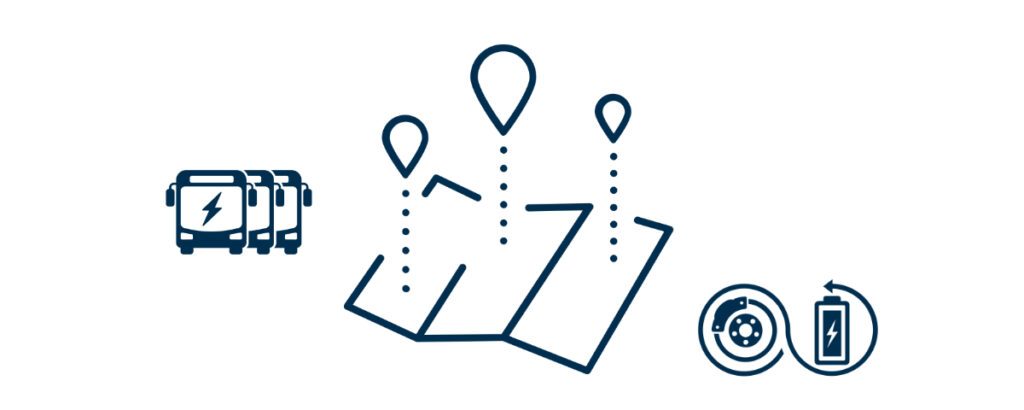Buffered-HLL – Grid friendly, cost-efficient high-power charging system for medium sized, commercial public transport in suburban areas

Project description
The electrification of public transport in rural areas has challenges: In the Buffered-HLL project, a consortium of different partners is developing and testing the charging infrastructure for electric buses (e-buses) at Bensheim region, Odenwald. In this joint project, RLI is developing a strategy for the complete electrification of buses operated by Verkehrsgesellschaft Gersprenztal (VGG). RLI is furthermore investigating the potential of charging technology for further applications.
Charging infrastructure for e-buses in rural areas
Medium sized, commercial bus companies are important for the local public transport in rural areas. They are relevant partners in electrification. As part of the project, a grid friendly charging infrastructure with depot and opportunity charging for public transport will be developed, implemented and tested during regular operation over 18 months.
Special challenges for network operators and transport companies
Network operators and transport companies in rural areas have specific challenges to overcome. For example, operators must ensure that the power grid and grid connection points can be operated safely with the additional load resulting from the electrification of public transport. Charging and storage solutions can help to provide an efficient network of high-power charging (HPC) stations without requiring a major expansion of the power grids. For transport companies, an economically viable supply of energy for electric buses is necessary. The routes and circulation planning of the vehicles are relevant. Buses often cover longer distances.
Strategy for the complete electrification of buses
In order to develop practical solutions to integrate the required infrastructure, RLI is creating a strategy for the complete electrification of the buses. Energy systems will be optimized at selected bus stops and at the depot to charge the vehicles. For the HPC-Charging stations the implementation of flywheel storage systems as buffer will be investigated. This is intended to minimize the fast charging impacts on the power grid.
In addition, RLI researchers are developing strategies to operate the charging stations economically and investigate their possibilities for different use cases by an analysis of transferability. This is how the potential for a roll out of the technology and its impact on power grids will be determined.
Project duration: July 2021 – June 2024
Tasks
- Development of a strategy for full electrification
- Install and optimize energy systems at stops and in the depot
- Potential survey for flexibility options
- Business model identification
- Potential survey for the use of flywheel storage systems
Results
- Electric buses are expensive to purchase. However, innovative operating models enable transport companies to save costs in the long term, which supports good public transport.
- Flywheel storage systems often simplify the installation of fast charging stations, making them cheaper and relieving the strain on the networks.
- In depots, intelligent charging strategies can reduce energy costs by up to 50 % and at the same time support the integration of renewable energies.
- The optimal design and operating strategy of the e-bus system depend on local characteristics, such as vehicle operating times and grid conditions.
- In the project, RLI scientists have developed the simulation tool SimBA, with which they can model the e-bus system and identify individual, economically optimal solutions for transport companies.

